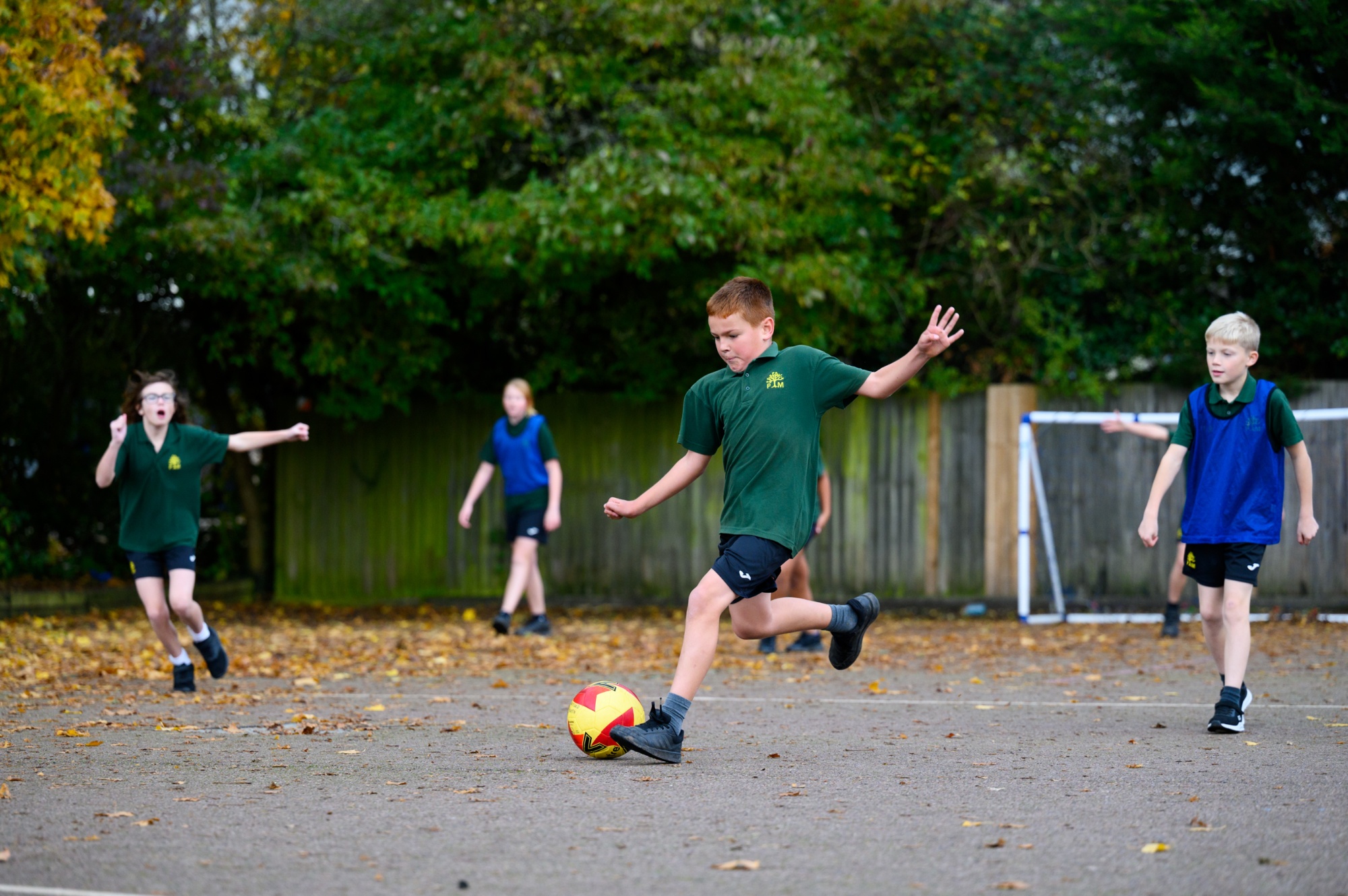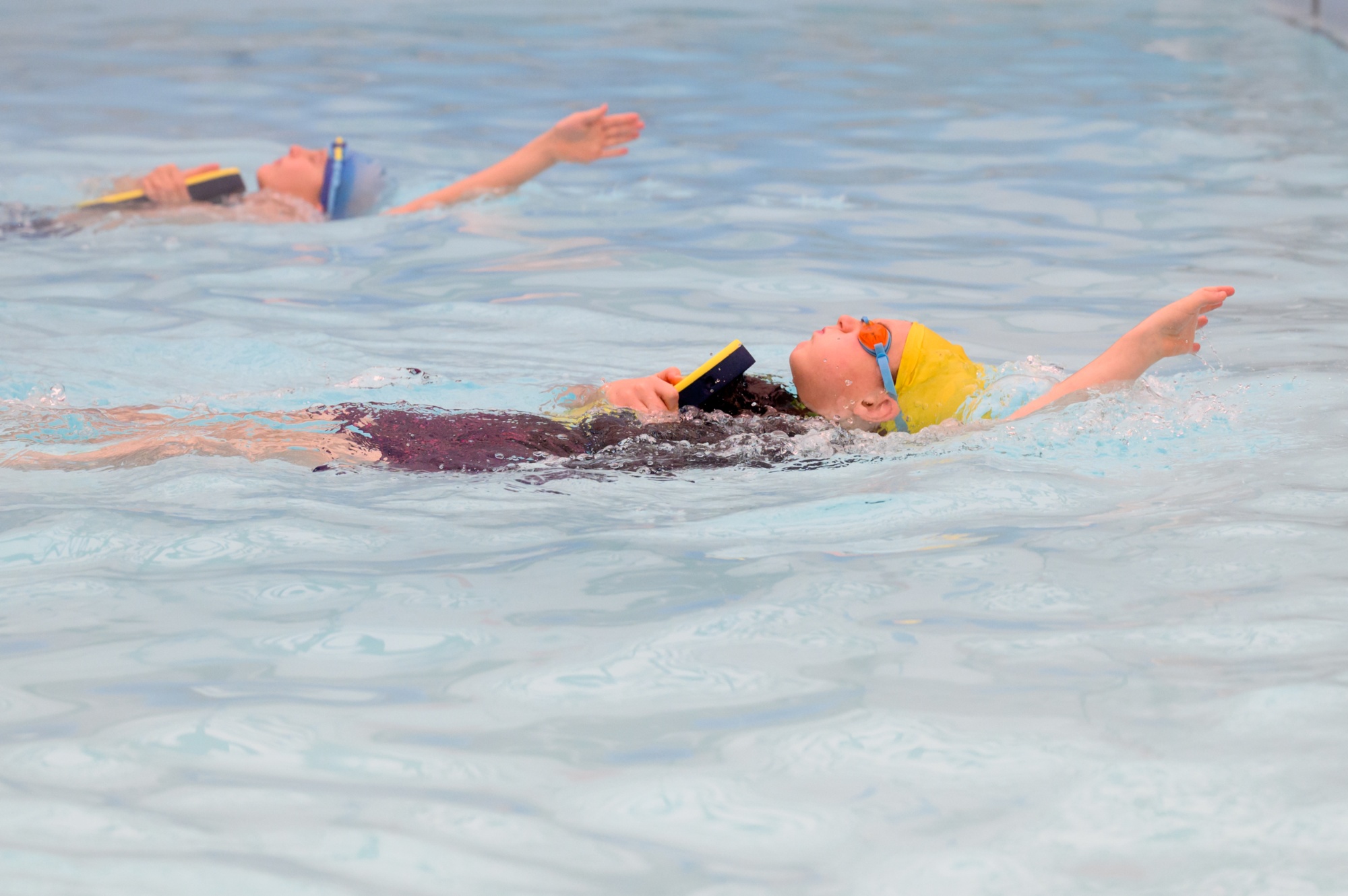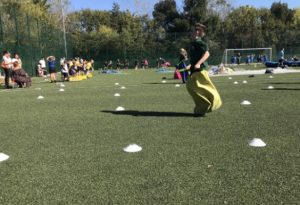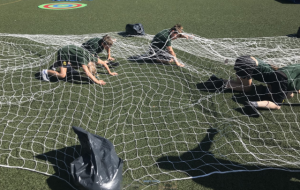PE and Sport
At Pear Tree Mead we deliver a broad and balanced Physical Education (PE) curriculum which aims to develop pupils’ physical competence and confidence and their ability to use these to perform in a range of activities. It contributes to their overall development by helping them to lead full, active and healthy lives.

PE sessions:
Children in Key stage 1 and 2 partake in 2 hours of PE a week. During this time children will participate in the 6 strands (see below) throughout the year. For year 1 – 5 this includes a 30 minute session of swimming throughout the year in our school pool. Year 6 children partake in a 30 minute swimming session during the summer term at Stewards Pool. Each class has an allocated hall and outdoor space (playground/field) session available to them.
Swimming
Swimming is an essential life skill that needs to be learnt by all children in order for them to stay safe. Therefore every child (year 5/6 summer term) must be swimming every week. In the past we have had children regularly ‘opt out’ for minor reasons, when the ability to swim and the understanding of water safety can and does save lives! So it is vital that all children take part. I would like you to think about the great opportunity we are offering your child at such a small price. We are delighted that we can off yearly swimming over many other school in our area.

Health and Safety
All teachers are responsible for safety in their own lessons and should therefore, be familiar with the procedures associated with the teaching of particular activities. This is regularly revisited by the school to update knowledge and skills.
Common sense safety precautions should be observed at all times. Facilities, apparatus and equipment should be checked at the start of the lesson e.g. that wall bars are secured properly, no mats overlapping, etc. Children should be taught to set out and use apparatus safely.
All children must participate in Physical Education unless a note is received from home. No verbal excuses will be accepted. Exercise is not only good for the body but also the mind!
Teachers should be aware of any disability/medical condition that could affect the child’s performance. Children should have the opportunity to highlight if they feel an activity or section of a session is going to be difficult. Alternative expectations may be given at this point. We ensure that the curriculum is accessible to all.
Some asthmatic pupils may need to keep their inhaler at hand during a PE lesson, and if this is the case, they should be taught to take responsibility for these, establishing good routines for their future safety.
Earrings must be removed and all jewellery taken off by children and staff before the start of the lesson. Children wearing jewellery will not be allowed to take part in any PE lesson or swimming. This will be discussed with families if preventative measures are not taken. We want to support children to take positive steps and ensure they are ready for their PE sessions without hinderance.
The curriculum
The Physical Education Curriculum includes six strands:
Athletics
Dance
Gymnastics
Games
Outdoor and adventure activities
Aquatics
Gymnastic activities
To perform confidently with varying degrees of control a simple range of actions, such as running, jumping, rolling, climbing, transferring weight, balancing, swinging and to link a series of movements with changes of direction, levels, speed, tension and rhythm. To be able to perform skills and sequences on the apparatus.
To be able to remember, select and repeat a sequence of movements, to practice through rehearsal and to adapt, practice and refine these actions.
To share, lift, carry, place and move apparatus safely.
Dance
To respond imaginatively to a variety of stimuli in order to show moods, feelings, ideas and create simple characters and narrative in movement.
To make dances with clear beginning, middles and ends. To adapt and refine performances, when working with others.
Games
To experience elements of games play which include chasing, dodging, avoiding and awareness of space and other players. Team play and interaction with others.
To improve their ball skills of sending, receiving and travelling, to propel objects such as balls, quoits and hoops using the hands, the feet and bats/racquets etc.
To make up, play and refine games and work within them.
Swimming
To develop confidence in water and explore different strokes. To show an understanding of water safety and codes of hygiene and courtesy for using swimming pools.
Athletic Activities
To practice and develop basic actions in running, throwing and jumping. To develop their accuracy, speed, height, length and distance.
Outdoor and Adventurous Activities
To explore the potential for physical activities within the immediate environment. Undertake simple orientation activities. Apply physical skills out of doors on suitable equipment and develop an awareness of basic safety practices.
Early Years Foundation stage (EYFS):
EYFS participate in PE 20 minutes – 1 hour a week, with a 30 minute swimming session. During this session the children develop their gross motor skills, balance and spatial awareness by taking part in a range of gym, dance and target practice activities. They also start to understand how to work as part of a team by playing games and using the parachute.
PE Kit:
For pupils, the dress code is as follows:
School PE kit or suitable alternative
Bare feet for gym & dance
Tracksuits or other warm alternative for outdoor activities during colder weather
Long hair must be tied back at all times
Swimming costumes for pool activities
Swimming hat for every child.
Jewellery must be removed before the lesson. Earrings, necklaces and watches are especially dangerous and must not be worn.
If a pupil forgets their kit, a spare one will be provided for them to wear. However, if they persistently forget their kit their parents will be contacted.
Competitive Tournaments:
At Pear Tree Mead we are fortunate to be an active member of the Harlow School Sports Partnership. This enables the children in Key Stage 2 to compete competitively, in a range of well organised tournaments, against other local Harlow primary schools. The year 5/6 children also take part in the Harlow Primary schools Football league and cup competition, which is run throughout the year.
Children in year 1/2 and year 4 have an opportunity to compete in a fun mini athletics tournament which is organised by Passmores Academy.
As a school, every term each class partakes in an intra-sports tournament within their key stage. This allows all children to participate competitively against their known peers.

Sports day:
This is an annual mix of sporting events and competitive races for all year groups. The field events are non-competitive as we aim for the children to enjoy participating for fun. Parents are more than welcome to watch and encourage their child in a sporting and supportive manner.
Inclusion in PE
Refer to the Pear Tree Mead Academy Inclusion Policy.
A Gifted and Talented Register is maintained.
Inclusion is a statutory requirement of the National Curriculum. The school will implement the three principles of:
- Providing all children with equal opportunities to participate and gain confidence in different physical activities regardless of their ability, gender or culture/ethnic background.
- Providing flexibility within the teaching to allow for differentiation enabling individuals to achieve their potential in all areas of PE.
- Opportunities must be created which promote an understanding and appreciation of each other’s abilities.
- Providing suitable activities for children that have specific physical disabilities that may impede their learning. Medical opinion and advice is always sought before these children participate in physical activities.
- No pupils will be excluded from any physical education programme unless advised by a medical professional.
- Lessons will provide good quality experiences that are suitably challenging for all pupils.
- Children will undertake different activities, but all will be given the same opportunity to achieve the aims through an appropriate range of activities.
- For children with limited gross motor skills, the integrity of activities will be maintained and expectations will take into account the individual needs of pupils.
- For the purposes of competitions, all children will be given the opportunity to participate in the experience.


Links between PE and other subjects
English
Language skills will be enhanced through physical activity by encouraging children to communicate and express their thoughts, ideas and emotions through movement, oral and written work as appropriate, e.g. evaluating their own and others performances.
Maths
Within PE lessons reference will be made to concepts of space, angles, distances and heights in order to reinforce and develop mathematical skills.
Assessment for learning
We assess the children in PE while observing them working during lessons. Teachers will assess children by making informal judgements as they observe them during lessons. Children are given oral feedback throughout the PE lessons on how to improve. Older pupils are encouraged to make judgements about how they can improve during sessions. For reporting purposes, PE lessons are observed and monitored, to ensure that all National Curriculum objectives are being covered.
Ways to support your child in PE at home:
Play active games with your children to help them to develop their coordination and movement. For example: Throwing and catching, tag, bowling, racquet sports, basketball and football.
Try to encourage your child to play outdoors (if it is safe to do so) on their bike, scooter or roller blades/skates.
Take them to a park which has climbing frames and swings once a week, so they are able to develop their coordination skills by climbing and moving along the apparatus. This will help them to improve their strength and stamina.
Help your child to understand the importance of leading an active lifestyle, including healthy eating. If you are able to do so try to walk to the shops/school/friend’s house instead of taking the car.
If your child shows a keen interest in a sport they have learnt at school or seen on TV, try to encourage them to join an out of school club like football, gymnastics, swimming, tennis etc. If you are unsure of your child’s local club, please use the website for a list of clubs in Harlow.
